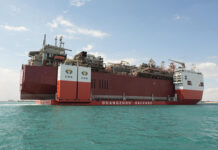
Israeli container ships are avoiding the Red Sea region as the conflict in Gaza and the heightened regional tension have increased the risks for all ships transiting the Suez Canal.
Even so, the consultancy Linerlytica said several US East Coast services are now trading via Suez to avoid the logjam at the world’s other busy waterway in Panama, but for Israeli vessels, the risk is considered far greater.
Munro Anderson, head of Operations at specialist war risk underwriter Vessel Protect – part of Pen Underwriting, told Container News, “Initially, the increased threat in the Red Sea and Gulf of Aden did not significantly alter vessel traffic, procedures, or insurance rates, except for Israeli-connected vessels, which started operating off automatic identification systems (AIS) to evade direct targeting.”
He added, “The risk was perceived as localised against Israeli-connected ships, with minimal impact on broader commercial traffic, as reflected in the ‘priced in’ existing insurance rates.”
ZIM has advised that its ZMP service will have longer transit times as the Israel-based company looks to protect its crew and vessels by avoiding the Red Sea and Arab regions, diverting ships on the far longer all water route via the southern tip of Africa.
Industry expert Darron Wadey at Dynamar conceded, “There are no real all-water alternatives to the Cape of Good Hope, despite its substantial distance, time and financial cost implications.”
However, Wadey believes there could be a silver lining for the industry in the all water route to Europe, in a conflict that undoubtedly qualifies as a sow’s ear.
Operators would need more ships to maintain a weekly frequency, “absorbing some of the over-capacity we have now, but this is still a least bad scenario if the Red Sea becomes impractical,” he argued.
Carriers have so far resisted imposing war risk surcharges, except for ZIM which announced its intention to apply charges from 22 November of between US$25 and US$100/TEU, depending on the service.
This may change, however, following the attacks on the wider commercial fleet. Hapag-Lloyd has already announced it will impose a war risk surcharge of up to US$80/TEU from 1 January, both into and out of Israel.
“Recent attacks, notably by Houthi rebels employing various kinetic means, signal a shift. These attacks are increasingly targeting vessels with less direct connections to Israel, as seen in the Sophie II incident, which lacked a clear Israeli link. This trend echoes the 2021/22 Israel/Iran ‘Shadow War’, where Iran targeted vessels like the M/V Tyndall, which had severed its Israeli connections,” said Anderson.
As a result, Anderson believes these attacks “indicate an escalating risk for the wider commercial market” operating in the region.
“While Israeli-owned vessels will continue to be high risk, all ship-owners/charterers will likely face increased premiums going forward as a result of the potential for aggregated losses to the market,” concluded Anderson. And that could mean that war risk surcharges could be introduced more widely in the near future.
Mary Ann Evans
Correspondent at Large





